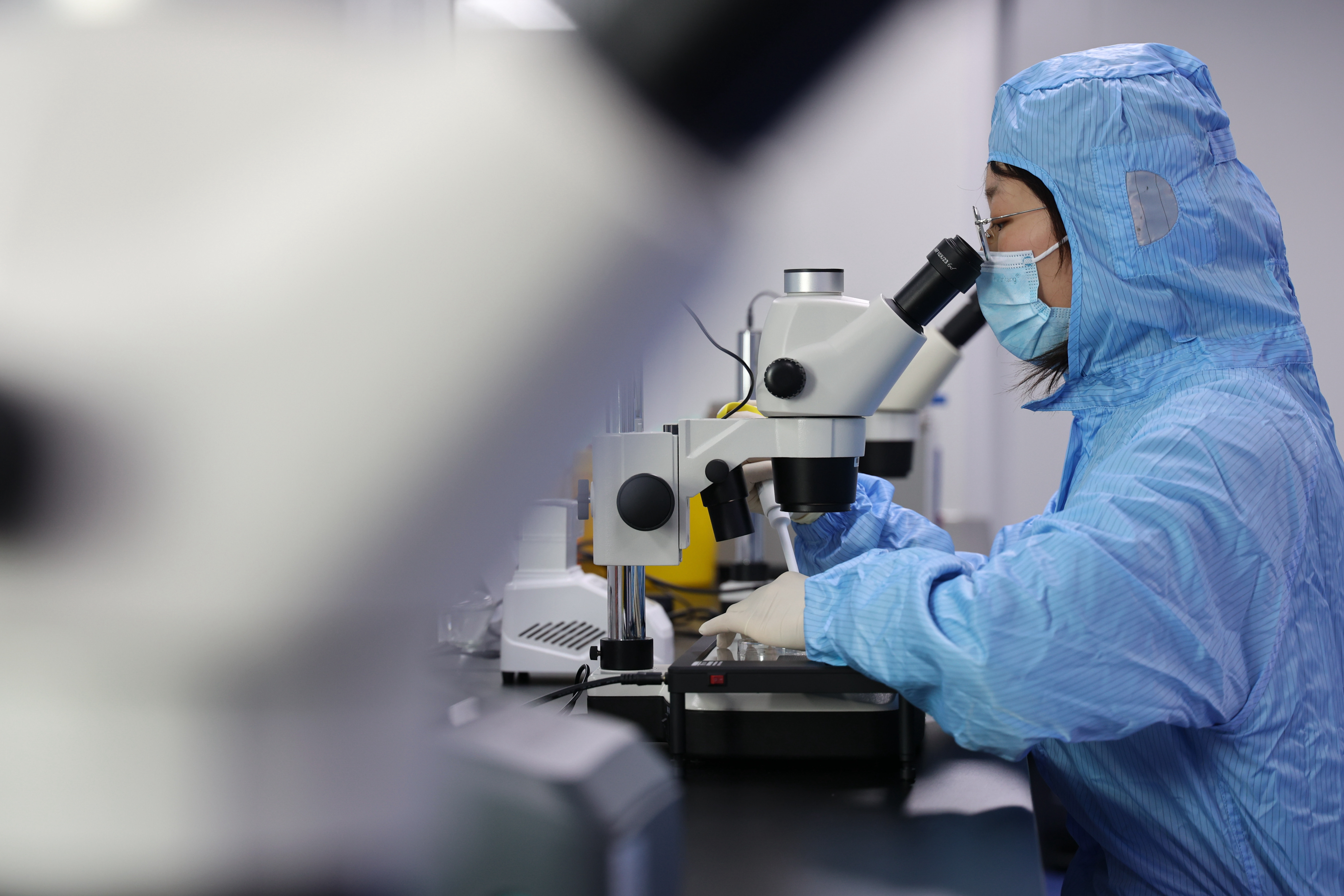
Big pharma’s growing China ties under threat from US crackdown

Lawmakers in Washington are planning to make it tougher for drug companies to do business with some Chinese biotech firms amid growing concerns over national security. Swiss pharmaceutical groups won’t escape the fallout.
In March, the CEOs of at least seven of the world’s largest pharmaceutical companies joined some 100 global executives in Beijing for the annual China Development Forum. The state-backed conference offers foreign business leaders the opportunity to network with Chinese officials and gives the government a platform to deliver its message to the international community.
The theme of this year’s gathering, “the continuous development of China”, was widely seen as a chance for Chinese leaders to woo more foreign investment amid slowing economic growth and increasing concerns about Western decoupling.
Sign up to get the latest news from Switzerland directly to your inbox
The event came at a delicate time for the pharma CEOs, however. Two months earlier, bipartisan legislation was introduced in the US House of Representatives that would ban Chinese biotechnology “companies of concern”, and any pharmaceutical companies working with them, from obtaining federal contracts.
A revised version of the bill, known as the Biosecure Act, was approved by the Committee on Oversight and Accountability in the House in May. It sets a deadline of 2032 for companies to end their business relationships with firms included on a list of “biotechnology companies of concern”. The current version lists five companies of concern, all based in China – BGI Group, MGI, Complete Genomics, WuXi Apptec, WuXi Bio, and their affiliates.
The Biosecure Act is the latest move by the US government to crack down on companies with ties to what it considers “foreign adversaries” – specifically, China, Russia, Iran and North Korea. US politicians have raised alarm over the Chinese government’s access to US health data and intellectual property, and the US’s growing dependence on Chinese companies for drug supplies. The fear, they argue, is that China could use this reliance to exert control over the market and leave US patients vulnerable.
US lawmakers have also stressed the need to secure US biotechnology leadership amid growing competition from China.
The bill would bar the US government from contracting with a “biotechnology company of concern,” as well as prevent companies (in the US or abroad) that contract with or receive funding from the federal government from having contracts with these companies. This would include, for example, deals with Medicare, the federal health insurance program for people 65 or older and younger people with disabilities, which covers around 66 million people.
Both chambers of Congress still have to pass the bill for it to become law and the November presidential election could derail the legislation. But, given strong bipartisan support, various US legal expertsExternal link believe some form of the bill will become law this year.
Although the bill is still winding its way through Congress, it could upend the global pharmaceutical sector’s partnerships with Chinese biotech firms. These have flourished over the past decade as a result of regulatory reforms initiated by Beijing and the emergence of dozens of companies developing innovative treatments.
China’s position as a major player in the biotech industry has driven foreign pharmaceutical groups to forge closer ties with local companies and integrate them into their own drug development. Foreign drugmakers have also become increasingly reliant on Chinese biotech firms for equipment, manufacturing and research.
“Swiss biotech and medtech companies are interested in Chinese companies not just as partners for market access in China but also as investors and for co-innovation,” said Anke Hollnagel, director for Asia at Basel Area Business and Innovation, an investment promotion association.
Booming industry
The bill comes at a time when the Chinese biotech industry is booming. Regulatory reforms and policies have sped up drug approvals and raised quality standards, making it easier for global companies to launch drugs in China, the second largest healthcare market after the US.
It has also made the sector more attractive to foreign and domestic investors. Some 11 of the top 15 global pharmaceutical companies now have a significant research hub in mainland China according to a reportExternal link commissioned by the European Federation of Pharmaceutical Industries and Associations. In 2019, Roche upgraded its research and development center in Shanghai with a RMB 863 million (CHF106 million) investment. It also invested RMB 300 million in an accelerator programme for local start-ups.
The Chinese government has set up seven biomedical city clusters including in Suzhou, just outside Shanghai, where the BioBAY industrial park hosts some 400 businesses, including at least 24 publicly listed companies and several big pharma companies such as Sanofi.
These investments are starting to pay off. The number of innovative drug candidates (both chemical and biologics) under clinical development in China tripled from 2017 to 2022. Around a quarter of these were discovered by companies founded in China according to a reportExternal link by consulting firm McKinsey.
“The level of innovation is very high in the Chinese biopharmaceutical industry,” said Thomas Heimann, an analyst at Swiss private equity healthcare investment advisor HBM Partners. “In contrast to Big Pharma in the west, there is still huge growth potential even with the established Chinese companies,” added Heimann, whose firm has holdings in Chinese companies including BeiGene, which develops drugs to treat cancer, and Mindray Medical, which designs and produces medical equipment and accessories.
In 2019, BeiGene received accelerated approval from the US Food and Drug Administration (FDA) for an internally discovered molecule for lymphoma, marking a first for a China-made cancer drug.
New partnerships
As Chinese companies emerge onto the global stage, they’ve attracted more big pharma companies who are keen to fill their drug pipelines with promising candidates. This also benefits Chinese companies who need funding and networks to develop and market their drugs abroad.
“An increasing number of Chinese biopharma companies are setting their sights on overseas markets, and commercialising blockbuster drugs in places like the US,” said Sara Zhou, CEO of Intercontinental Capital, a financial advisory firm focused on healthcare in China.
Out of more than 70 such out-licensing transactions that occurred in 2023, Zhou says that more than 15 exceeded $1 billion, setting a record for both volume and transaction size.

More
Big Pharma steps up race for AI-discovered drugs
Earlier this year, Roche signed a partnership and licensing dealExternal link worth over $1 billion with Chinese biotech company MediLink Therapeutics giving the Swiss pharma group sole international rights to develop, produce and market MediLink’s treatment for solid tumours.
AstraZeneca bought NASDAQ-listed Gracell Biotechnologies, a Chinese CAR-T cell therapies company for $1.2 billion last December.
Several Chinese companies have set up subsidiaries in overseas pharma hubs. Hengrui MedicineExternal link, (known internationally as Luzsana Biotechnology), one of the country’s largest pharmaceutical companies, along with Luye Pharma, BGG, and BeiGene have all opened European bases in Basel in the last five years.
Cloud of uncertainty
It is too early to say how the Biosecure Act will impact global pharma’s ties with Chinese biotech. Most companies don’t share their supplier lists publicly so it’s unclear how many work with the Chinese companies named in the Act. Wuxi AppTec, which provides manufacturing and drug development services, has claimed its clients include the top 20 pharmaceutical companies. By one estimateExternal link, WuXi has been involved in developing a quarter of the drugs used in the US.
During a media call in late April, Novartis Chief Financial Officer Harry Kirsch said that like many drugmakers, the company has ties to Chinese firms in the manufacturing and contract research space. The Basel-based group is now weighing changes to its contracting relationships with Chinese companies “so that we are fully aligned” with potential US regulations, he said.
+ How Swiss-Chinese relations are weathering geopolitical storms
US lawmakers have already called for investigations into other Chinese biotech companies. A recent reportExternal link from US health media company STATnews revealed that some global companies are actively looking for alternatives to Chinese partners amid concerns that more Chinese companies could be targeted by the bill.
In late March, AstraZeneca saidExternal link that it is planning separate supply chains so that it can manufacture drugs for the US and China independently. Germany-based Merck is reportedly planning a similar move to produce in China for the Chinese market.
“The Biosecure Act is a threat,” said Heimann from HBM Partners. “However, it’s hard to know at this point how much of a threat. The major issue right now is uncertainty.”
Edited by Nerys Avery/vm.

In compliance with the JTI standards
More: SWI swissinfo.ch certified by the Journalism Trust Initiative



























You can find an overview of ongoing debates with our journalists here . Please join us!
If you want to start a conversation about a topic raised in this article or want to report factual errors, email us at english@swissinfo.ch.